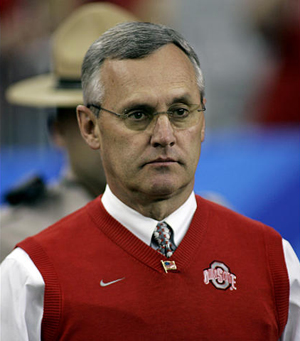
Those who have read my column throughout the year know I'm not the NCAA's biggest fan—I've argued for years, both in print and simply in friendly debate, that college athletes deserve to be paid for the money they make for their schools and the NCAA. But even an idealist like me knows that such a solution is years away, if not entirely infeasible, and so I've tried to let sleeping dogs lie (even though the master satirists at South Park seem to have my back).
But even if the NCAA continues its current policy regarding athlete compensation, it is widely recognized that the organization's current system of punishment is largely unfair. The debate has arisen once again after USC was stripped of its 2004 national title in the aftermath of the Reggie Bush scandal and amidst worsening allegations against Ohio State and its former coach Jim Tressel.
In the past weeks ESPN's talking heads have discussed ad nauseam how these schools should be punished, and whether existing punishments are fair. The consensus seems to be that they are not—while the players and coaches who committed or presided over the infractions (Reggie Bush and Pete Carroll immediately come to mind) get off scot-free, student-athletes currently at the school are the ones hit with postseason bans and other punishments.
Numerous proposals have offered fixes to the current system—and while most all of them are improvements over the status quo, they all seem to be either implausible or not addressing all the problems. With that being said, I present my common-sense three-step process (drawing from many existing arguments) to fix NCAA Sanctions:
1) Make guilty players pay back their scholarships.
It's difficult to punish players who aren't paid by the NCAA, especially when they've left college athletics and thus can't be castigated via suspensions. Thus, any argument that says players who violated NCAA rules should be fined is inherently flawed. Still, though, it is clear that the players who violated rules themselves, and not future players at that school, should be the ones punished.
There appears to be a fairly simple solution that no one has articulated, however, and it lies in the system of "letters of intent." A large majority of college athletes indicate their intention to play at a school via signing one of these letters, which is considered a binding agreement between that player and the school. But as it stands, these agreements are not a required part of the recruitment process, and in recent years some high-profile players, such as Kentucky's Brandon Knight, have chosen to commit to a school without a letter of intent.
Why can't the NCAA use these agreements to their advantage? Make such a letter of intent mandatory to play a college sport. Add as a stipulation that if the player is ever deemed guilty of a major NCAA violation—either during their careers or afterwards—they must donate the total monetary amount they received from the school during their career–via scholarships, housing, food, gear, etc.—to a charity of their choice.
It might not seem like a huge punishment to multi-millionaires, but the amount—which would in all likelihood exceed six figures—would certainly put a dent in anyone's wallet. Given the fact that players aren't necessarily guaranteed successful professional careers while in college, the threat of such a punishment would certainly discourage violations while also ensuring that only the guilty are punished.
Now, the legality behind this system might need to be probed—I'm anything but a potential lawyer—but if it could be implemented, it seems like it would solve many of the NCAA's problems.
2) Do the same for college coaches.
While the NCAA prevents players from being paid, their coaches, in most cases, are paid exorbitant sums of money. Make it a requirement in any contract to coach an NCAA sport that, if an NCAA violation is found to be committed under a coach's regime—again, whether the coach is currently at the school or not—they are liable to be fined in amounts depending on the severity and amount of violations.
Then pleading ignorance, like Tressel originally did, wouldn't absolve a coach of guilt—and coaches will be forced to be more involved in ensuring violations do not occur.
3) Fine the schools themselves instead of handing out postseason bans.
Postseason bans punish schools mainly via the money they lose from being banned from bowls or tournaments. But the individuals who are really punished are the current players—those who weren't present during the violations and oftentimes committed to a school before such bans were announced, but nevertheless are prevented from enjoying the full experience of playing a college sport.
So why not attack the schools' pockets, but not their current players? Fine schools an amount proportional not only to the severity of the violations and their knowledge of them, but also proportional to the amount of money the school made during that player's career.
Regardless, this debate is likely not to be resolved anytime soon—but that certainly won't stop it from raging on. Feel free to leave your comments on my proposal, your own proposals, or your thoughts on these sagas in general, below.
Get The Chronicle straight to your inbox
Signup for our weekly newsletter. Cancel at any time.
